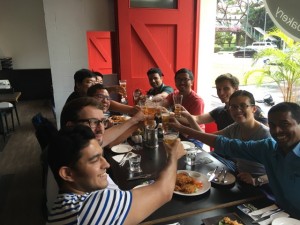“Do good work and enjoy the work that you do. Money will follow. Make sure that you don’t work for money alone (As the sole aim!).”
With these words, Professor Tan signed off the Derivatives and Risk Management course, the last elective module for the MBA students of 2016 who chose the Banking and Finance Track. Derivatives, much hyped and complex financial instruments, were created with the aim of risk management in finance. However, they are predominantly used for speculation and trading. Hence, Prof Tan asked the class to always wear two hats while analysing derivatives: Are you going to manage risk? Or are you going to trade?
The Derivatives classes were exclusively scheduled on weekends, but as the class size was small and the topic was interesting indeed, all sessions were quite engaging and nobody minded weekend work. The class participants discussed a wide variety of topics ranging from the creation of structure products, various risk mitigation strategies used by corporations, the fall of Lehman brothers and many more, and learnt from a variety of case studies discussed during lectures.
After the last class session, Prof Tan invited his students to a celebratory meal to Spruce at Bukit Timah, which was a fire station prior to it being renovated to a modern day bar/bistro. The trip to Spruce marked the closure of elective classes for the MBA class of 2015/16 and Spruce´s location in beautiful greenery, overlooking a mountain, served to be the ideal getaway to clear the mind after a whole day class . Tower beers were being emptied and a lively discussion on topics such as cultural diversity, returns of VC firms and even the Chinese preference of Tibetan Mastiff dogs ensued. It was time to celebrate.
Before leaving the event, all students cheered Prof Tan for his upcoming Gobi Desert Challenge wherein he and his EMBA team will represent the Nanyang Business School in a daunting desert challenge over the course of 4 days, and everyone promised to take the message from Professor Tan to heart: Make sure to give back to society.





You must be logged in to post a comment.